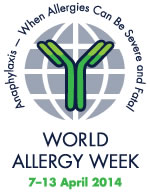World Allergy Week
7-13 April 2014
 World Allergy Week is an initiative of the World Allergy Organization (WAO). This year the focus is on increasing awareness of anaphylaxis.
World Allergy Week is an initiative of the World Allergy Organization (WAO). This year the focus is on increasing awareness of anaphylaxis.
Anaphylaxis is a potentially life-threatening allergic reaction that requires urgent medical treatment. It is therefore essential to know how to recognise and respond to an anaphylaxis emergency as well as implement appropriate risk minimisation strategies to prevent exposure to known allergens.
The Australasian Society of Clinical Immunology and Allergy (ASCIA), a founding sponsor of AIFA, is supporting World Allergy Week with the release of three new resources for patients at risk of anaphylaxis.
The important resources to assist patients at risk of anaphylaxis are as follows:
- Anaphylaxis Checklist – to be completed by medical practitioners to ensure they address all the needs of the patient at risk of anaphylaxis, including teaching the patient how to use their adrenaline autoinjector using a trainer device.
www.allergy.org.au/health-professionals/anaphylaxis-resources/anaphylaxis-checklist
- Transitioning from Paediatric to Adult Care for Severe Allergies – a patient information sheet to help teenagers transition from paediatric to adult care. Teenagers and young adults have been identified as a high risk group for fatal anaphylaxis. Therefore, it is important they have the skills to manage their severe allergies as well as know how to access their health care professionals.
www.allergy.org.au/patients/allergy-treatment/transitioning-from-paediatric-to-adult-care
- Asthma and Anaphylaxis patient information – asthma, food allergy and high risk of anaphylaxis frequently occur together and asthma increases the risk of fatal anaphylaxis and therefore it is essential that patients at risk of anaphylaxis who also have asthma, ensure their asthma is well managed.
www.allergy.org.au/patients/asthma-and-allergy/asthma-and-anaphylaxis
Whilst it is essential for health professionals to know how to treat anaphylaxis in an emergency and also provide appropriate ongoing management of patients at risk of anaphylaxis, it is also vital that patients are educated about how to manage their severe allergy.
ASCIA is a WAO member Society
www.worldallergy.org


